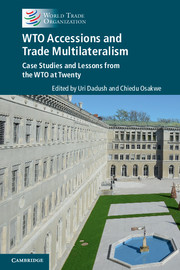Book contents
- Frontmatter
- Dedication
- Contents
- List of contributors
- Foreword
- Acknowledgements
- List of abbreviations
- Editors' note
- PART I WTO accessions, the trading system and the global economy
- PART II Overview: systemic outcomes from accessions
- PART III Members’ perspectives on accession negotiations
- Original members
- Article XII members
- 16 The 2001 WTO accession of China: negotiating experience – challenges, opportunities and post-accession approaches
- 17 The 2001 WTO accession of the Separate Customs Territory of Taiwan, Penghu, Kinmen and Matsu: negotiating experience – challenges, opportunities and approaches post-accession
- 18 The 2004 WTO accession of Cambodia: negotiating priorities and experience – growth and integration eleven years later
- 19 The 2008 WTO accession of Ukraine: negotiating experience – challenges, opportunities and post-accession approaches
- 20 The year 2012: WTO accession of Montenegro – why did we apply to join? Priorities and results
- 21 The 2012 WTO accession of Russia: negotiating experience – challenges, opportunities and post-accession approaches
- 22 The 2013 WTO accession of Lao PDR: specific commitments and the integration of least-developed countries into the global economy
- 23 The 2013 WTO accession of Tajikistan: experience of a landlocked economy in a changing regional economic configuration
- 24 The 2014 WTO accession of Yemen: accession negotiations as an instrument for domestic reform, national security and international cooperation
- PART IV Working party chairpersons’ perspectives on accession negotiations
- PART V Salient features inWTOAccession Protocols
- PART VI Conclusion
- Annex: Contributor biographies
- Index
- Plate section
18 - The 2004 WTO accession of Cambodia: negotiating priorities and experience – growth and integration eleven years later
from Article XII members
Published online by Cambridge University Press: 05 November 2015
- Frontmatter
- Dedication
- Contents
- List of contributors
- Foreword
- Acknowledgements
- List of abbreviations
- Editors' note
- PART I WTO accessions, the trading system and the global economy
- PART II Overview: systemic outcomes from accessions
- PART III Members’ perspectives on accession negotiations
- Original members
- Article XII members
- 16 The 2001 WTO accession of China: negotiating experience – challenges, opportunities and post-accession approaches
- 17 The 2001 WTO accession of the Separate Customs Territory of Taiwan, Penghu, Kinmen and Matsu: negotiating experience – challenges, opportunities and approaches post-accession
- 18 The 2004 WTO accession of Cambodia: negotiating priorities and experience – growth and integration eleven years later
- 19 The 2008 WTO accession of Ukraine: negotiating experience – challenges, opportunities and post-accession approaches
- 20 The year 2012: WTO accession of Montenegro – why did we apply to join? Priorities and results
- 21 The 2012 WTO accession of Russia: negotiating experience – challenges, opportunities and post-accession approaches
- 22 The 2013 WTO accession of Lao PDR: specific commitments and the integration of least-developed countries into the global economy
- 23 The 2013 WTO accession of Tajikistan: experience of a landlocked economy in a changing regional economic configuration
- 24 The 2014 WTO accession of Yemen: accession negotiations as an instrument for domestic reform, national security and international cooperation
- PART IV Working party chairpersons’ perspectives on accession negotiations
- PART V Salient features inWTOAccession Protocols
- PART VI Conclusion
- Annex: Contributor biographies
- Index
- Plate section
Summary
ABSTRACT
Cambodia was the first least-developed country to complete negotiations to become a member of the WTO. Its negotiations took place in the context of the Decision on LDC accessions taken by the WTO General Council in December 2002, in which WTO members agreed that they would be bound by certain restraints in dealing with LDCs seeking to join the WTO. Given the constraints that, as an LDC, it faced when entering the negotiations, Cambodia recognised that joining the WTO could play an important part in accelerating its growth and development. This chapter describes Cambodia's approach to the accession negotiations: its negotiating strategy, the negotiations themselves and their outcome and Cambodia's post-accession activities. The foundation of all international trading arrangements is the WTO, its concepts and its rules, most of which are carried over into preferential trading arrangements. Being a member of the WTO provides a member's traders with the transparent and predictable trading environment that they need to prosper. It can truly be said that being a WTO member is one of the main pillars of Cambodia's successful economic performance.
Cambodia applied to become a member of the WTO in October 1994. It completed its WTO accession negotiations in May 2003, making it the first of the least-developed countries (LDCs) to complete negotiations to become a member of the WTO. Cambodia shares with Nepal the distinction of being an LDC pioneer in exploring what was then the uncharted territory of LDC accession.
Cambodia's accession negotiations followed the broad outlines that are familiar to all those who have participated in the accession process. Negotiations proceeded simultaneously in four areas: WTO members' examination of Cambodia's trade regime; bilateral negotiations with members on tariff bindings on goods; bilateral negotiations with members on market access for services; and the examination of state support for agriculture.
Cambodia's negotiations took place in the context of the Decision on LDC accessions taken by the WTO General Council in December 2002. In this, members agreed that they would be bound by certain restraints in dealing with LDCs seeking to join the WTO.
- Type
- Chapter
- Information
- WTO Accessions and Trade MultilateralismCase Studies and Lessons from the WTO at Twenty, pp. 464 - 482Publisher: Cambridge University PressPrint publication year: 2015

